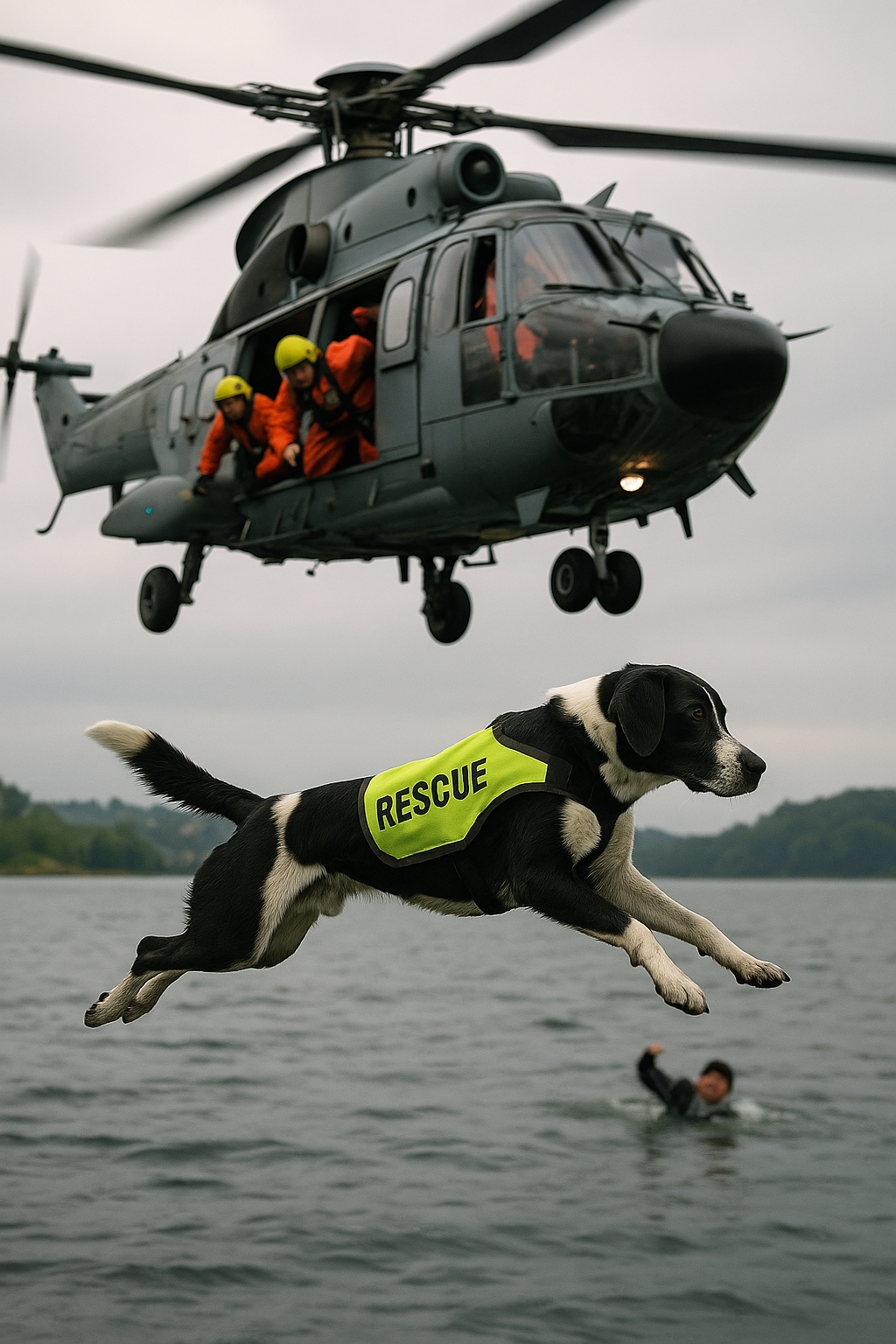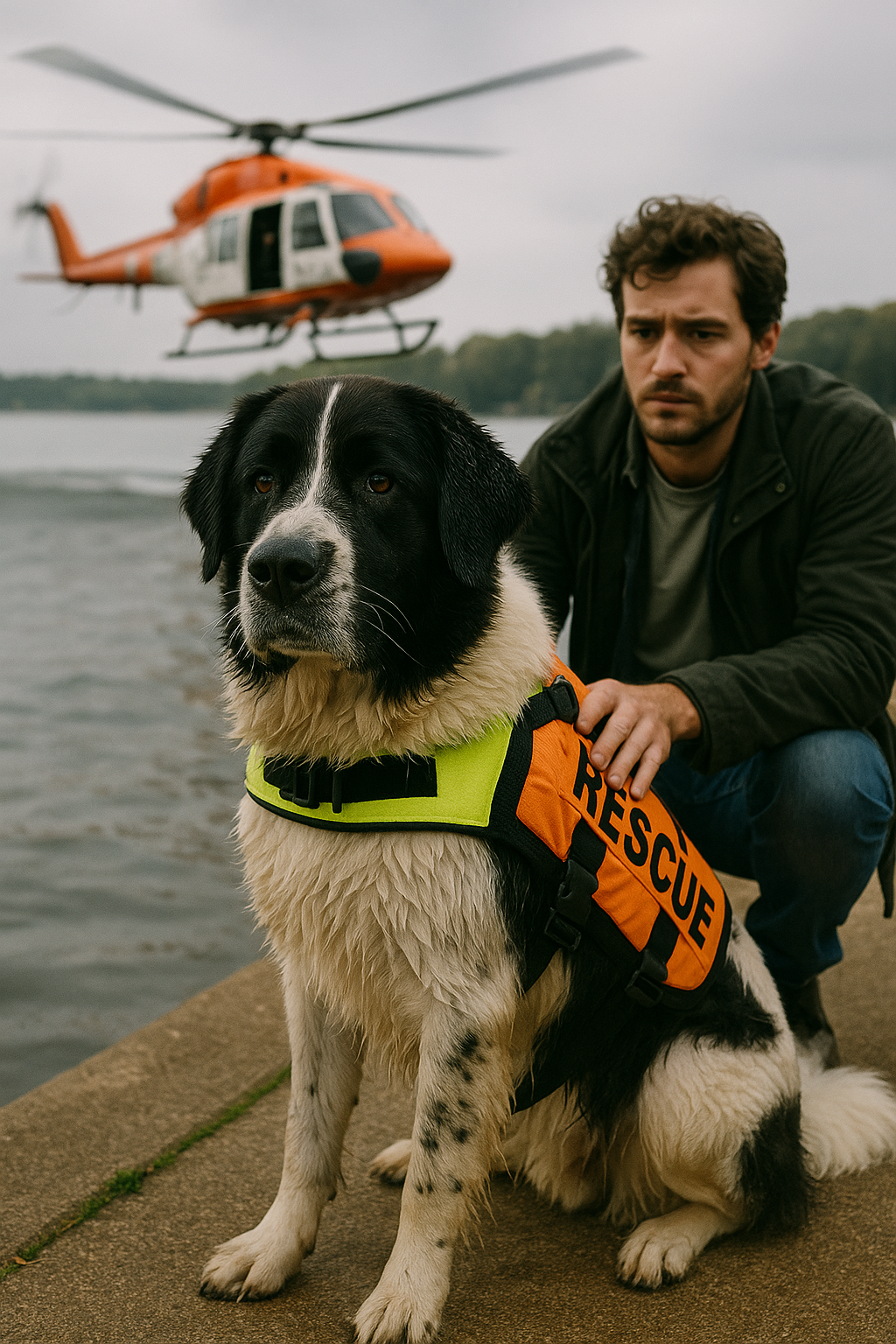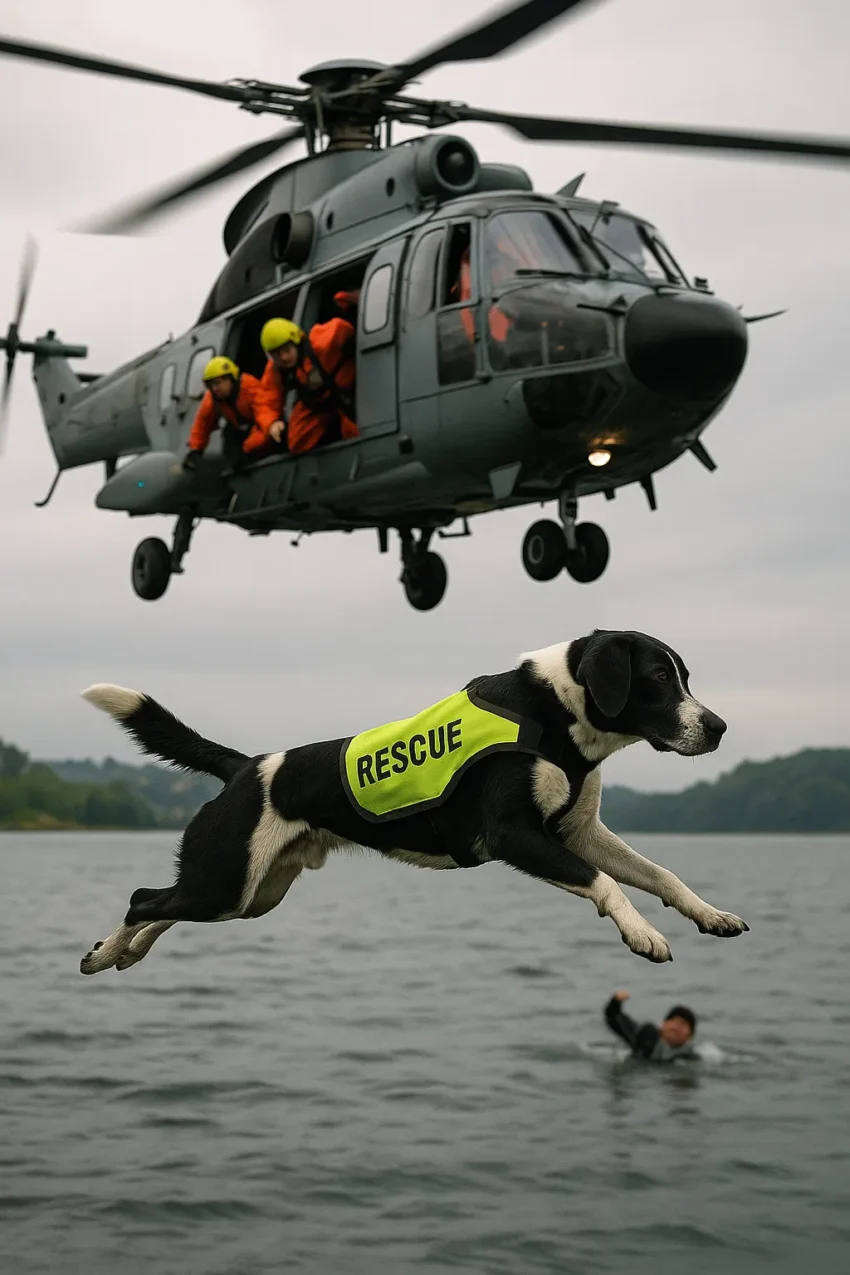I wasn’t supposed to be near the water that day.
It was just a short break from my shift at the marina café. I grabbed a sandwich and headed to the dock for some peace and quiet. But then I heard it—the unmistakable thrum of a helicopter cutting through the sky. It came out of nowhere, low and fast.
People started pointing, filming, whispering. But I just stood there, frozen. Something felt… off.
And then I saw the dog.
A massive black-and-white shepherd mix, suited up in a neon rescue vest, standing at the open helicopter door like he’d done this a hundred times before. Calm. Steady. Ready.
The crew inside shouted over the blades, pointing down at the lake.
I followed their gestures—and saw someone in the water. Just a bobbing head, barely visible, too far for anyone to help from the shore.
Then the dog leapt.

A clean, practiced dive straight from the chopper. He vanished under the surface for a heartbeat, then surged forward with powerful strokes.
I didn’t realize I was moving until I was already up on the railing, heart pounding. Something was tugging at my gut.
And then I saw him.
The person flailing in the lake—barely conscious, soaked and limp—was wearing the windbreaker I’d helped pack into a duffel bag that very morning.
It was my brother. Matt.
And suddenly, last night came flooding back.
“I can’t take it anymore, Evan,” he’d said before slamming the door. “Everyone’s got it figured out but me.”
I thought he’d gone to clear his head. Maybe sleep in his car like he sometimes did. But he hadn’t come home.
I never imagined he’d go near the lake. He hated cold water. Hated deep water.
The dog was nearly there now, muscles cutting through the ripples with purpose. A rescuer in a wetsuit followed, tethered to a rope. But the dog got there first.
He latched gently onto Matt’s jacket—like he’d done it a dozen times before. And Matt… didn’t resist. He let his body go limp.
People were shouting on shore. A lifeguard called for a stretcher. Paramedics pushed through the crowd. I climbed down, legs like jelly, and stumbled forward.
They pulled Matt out, pale and barely breathing. Lips blue. An EMT began CPR while another injected something into his arm. I couldn’t get close, but I saw his fingers twitch.
The dog—soaked and panting—sat beside the stretcher, watching, waiting.

I knelt next to him.
“Thank you,” I whispered, not knowing if he could understand.
But he licked my wrist, gentle and deliberate. Like he did.
The crew loaded Matt into the ambulance. One of them told me which hospital they were going to. I was already in my car before he’d finished.
At the hospital, the wait was endless.
Texts poured in. I didn’t answer a single one. I just stared at the doors.
Eventually, a nurse stepped out. “He’s awake,” she said. “Still groggy, but he asked for you.”
When I entered his room, Matt looked fragile. A nasal tube. Beeping monitors. He glanced at me with guilt swimming in his eyes.
“I didn’t mean for it to go that far,” he whispered. “I thought I’d just… swim a bit. Clear my head.”
I nodded, even though I knew better. He couldn’t swim that far. He knew it. But I didn’t call him out.
“You scared the hell out of me, Matt,” I said quietly.
He blinked. “That dog… he saved me.”
“Yeah,” I said. “He really did.”
The next few days blurred together. Matt stayed under observation. I barely left his side. Our mom flew in from Denver. We told her it was a hiking accident near the lake.
Matt didn’t argue. He barely spoke.
Then, three days later, I saw the dog again.
I was heading out to grab a coffee when I spotted him—tied to a post outside a news van. Same black-and-white coat. Same bright vest. But this time, he looked… restless. Like he didn’t want to wait.
His handler came out moments later. Tall woman with cropped gray hair and a jacket patch that read K9 SAR Unit. She held a coffee and smiled when she saw me watching.
“You saw the rescue?” she asked.
I nodded. “That was my brother.”
Her expression softened. “He’s lucky. Very lucky.”
“What’s the dog’s name?” I asked, pointing.
“Ranger,” she said. “Been with me six years. Seventeen rescues and counting.”
“He’s incredible.”
She scratched behind his ears. “He’s more than that. He’s stubborn. Loyal. And somehow, he always knows who needs saving.”
I crouched and held out my hand. Ranger sniffed it, then wagged his tail.
“He wouldn’t leave the hospital door last night,” she added. “I had to carry him out.”
I didn’t know what to say. So I just nodded.
Days passed. Matt began to talk more. First about the hospital food. The smell. The bad TV shows. Then, one night, as I was leaving, he stopped me.
“I didn’t want to die,” he said softly.
I turned around.
“I thought I did,” he continued. “But out there, when my arms went numb… when I started sinking… all I wanted was one more try.”
He looked up at me, eyes clearer than they had been in months.
“Then I felt something grab my jacket. I thought it was a hallucination.”
“That was Ranger,” I said.
Matt nodded. “He pulled me out before I even realized I wanted saving.”

After he was discharged, Matt didn’t waste time. He signed up for therapy—committed to it. Not just the weekly kind. He said he owed it to himself… and to Ranger.
A few months later, something changed in him. He started volunteering at the local rescue center. Walking dogs. Cleaning kennels. Watching training sessions.
By summer, he said, “I want to work with rescue dogs. I think I’d be good at it. Maybe help people who forget they want saving, too.”
I told him it was the best idea he’d ever had.
Then, one evening, a letter arrived. Thick envelope. Official seal.
It was from the K9 SAR Unit.
Inside was a thank-you note… and an offer. Ranger was retiring.
“He’s getting older,” the letter read. “He deserves a warm home—and someone who understands second chances.”
At the bottom was the question: Would Matt be interested in adopting him?
Matt didn’t even blink. “Yes.”
When Ranger stepped into our house for the first time, it was like he already belonged. He sniffed the couch, found a sunny patch by the window, and plopped down.
Matt bent beside him. “Hey, partner,” he whispered.
From that day on, they were inseparable.
They trained together. Hiked together. Ranger watched over him like a guardian angel in fur.
Eventually, Matt earned his certification to assist in search-and-rescue training. “Feels like coming full circle,” he said.
A year after the rescue, the same helicopter team returned to the marina for a demonstration.
This time, I stood onshore—filming.
Matt was beside the lead trainer. Ranger stood alert at his side.
When they asked for a volunteer to play the “lost hiker,” I raised my hand.
It felt symbolic.
As the drill played out, Ranger didn’t sprint. He walked. Calm. Steady. Confident. A veteran who knew exactly what to do.
People clapped. Some even cried. A little boy ran up and hugged Ranger tight. The dog just stood there, tail wagging softly.
Across the crowd, I caught Matt’s eye.
He smiled. A real one. The kind I hadn’t seen since we were kids.
Later that night, we sat by the lake—the same lake that nearly took him.
Matt tossed a pebble into the water. “Weird, isn’t it?” he said. “That something that almost ended me… ended up giving me a reason to keep going.”
“Life’s weird like that,” I said.
Ranger rested his head on Matt’s lap, eyes closed.
“He saved me,” Matt said. “Not just that day. Every day after.”
I couldn’t speak. Just nodded, throat tight.
That’s the thing about second chances. They don’t always come with a sign or a warning.
Sometimes… they leap out of helicopters.
If this story moved you even a little, share it. Someone out there might be waiting for their second chance—and they might not even know it yet.

